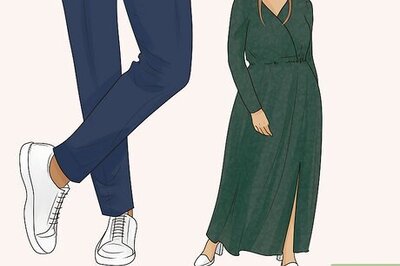
views
Using Good Shaving Practices

Give yourself a hot towel treatment before you shave. Using a warm moist towel on your face and neck before you start shaving may help to prevent acne. A warm moist towel can moisturize your skin and may help to open up your pores as well. To give yourself a hot towel treatment, hold a clean washcloth or hand towel under warm to hot running water until it is saturated. Then, wring out the excess water and place the towel over your face and neck. If desired, you can also add a drop of an essential oil of your choice to the towel to give it a nice scent. Keep the towel on your face for three to four minutes.

Choose a gentle shaving cream. Look for a product that is made for sensitive skin and that will lubricate your face for shaving. Products labeled for “sensitive skin” or that claim to be “non-irritating” are good options. If you are having problems with frequent acne, then you may also consider asking your doctor about a prescription shaving cream that contains benzoyl peroxide or an antibiotic that you can apply to your skin.

Massage the shaving cream into your skin. Taking time to massage the shaving cream into your skin will help to ensure that your skin and facial hair are well-moisturized when you shave. Use circular motions to massage the cream into the areas of your face and neck that you will be shaving. Allow the shaving cream to stay on your skin for about five to 10 minutes. This will help make shaving easier by softening up your facial hair and skin.

Use gentle downward strokes while shaving. Shave with the grain of your hair rather than against it. Shaving with the grain will help to reduce irritation and make acne less likely.Do not pull your skin taut as you shave. Use a new sharp, single blade razor every time. Using a new razor every time that you shave will reduce the chances that you will nick yourself or irritate your skin. Rinse the razor after each stroke to keep the blade free of shaving cream and hair that may interfere with a close shave.

Use gentle pressure with an electric razor. You can adjust the closeness setting on an electric razor, which may help to prevent ingrown hairs. If you use an electric razor, then make sure that the razor is not set on the closest shave setting and do not press too hard on your skin as you shave.

Consider using a depilatory cream instead of shaving. Depilatory creams can help to reduce ingrown hairs, so you may also consider these as an alternative to shaving. Make sure that you test the product on a small patch of your skin before applying it to a large area.

Moisturize your face after shaving. After you finish shaving and rinse away the shaving cream, apply a gentle moisturizer. Do not use aftershave or any other products that contain alcohol as this may irritate your skin. Try using aloe or baby oil after shaving to moisturize your skin.
Using Good Face Washing Technique

Wash your face twice per day. Washing your face twice per day and any time that you get sweaty or dirty can help to prevent acne as well. Use a gentle, cleanser for your skin and follow up cleansing with a moisturizer. Select non-comedogenic products for your skin. Products labeled as non-comedogenic will not clog your pores, so they are less likely to cause acne. Steer clear of products that contain alcohol. Alcohol can irritate your skin, which may make acne look worse. Look for cleansers that contain salicylic acid. Cleansers that contain salicylic acid may help to prevent acne, but keep in mind that you have to use these products regularly to see an improvement.

Apply cleanser with your fingertips. When you wash your face, always use your fingertips to apply the cleanser to wet skin. Do not use a washcloth, sponge, or any other harsh cleansing tools. These tools may cause irritation, which can cause irritation and may also make acne worse. It is also important to avoid scrubbing because it can scar your skin.

Rinse your face with lukewarm water. When you wash your face, make sure that you rinse it with lukewarm water. Do not use hot or cold water because these temperatures may irritate your skin. Instead, use water that is lukewarm to gently rinse away dirt and debris.

Pat dry with a clean towel. Following cleansing, dry off your face with a clean cotton towel by using a gentle patting motion. Do not rub your face because this may irritate the skin and cause acne to look worse.
Getting Help

Try retinoid creams. Retinoid creams can help to remove dead skin cells and unclog your pores to help prevent future acne outbreaks. This is one of the most common treatments for acne, but it is available by prescription only. Talk to your doctor if you are interested in trying a retinoid cream.

Ask about antibiotics. Sometimes it may be necessary for you to take an antibiotic to combat skin infections caused by acne. If you have moderate to severe acne, then your doctor may prescribe an antibiotic cream. An antibiotic cream will help to combat any infections that your acne has caused. Make sure that you use the antibiotic cream exactly as directed and do not stop using it until your doctor tells you to.

Talk to your doctor about corticosteroids. Corticosteroid creams and injections can also help to improve the appearance of acne. Your doctor may give you a corticosteroid cream to apply or inject a corticosteroid into your skin to improve its appearance.

Consider isotretinoin. If nothing seems to improve your acne, then your doctor may prescribe an oral retinoid called isotretinoin. This medicine is very effective, but it has some severe side effects, so it would only be used as a last resort. Side common side effects of isotretinoin include rash, depression, nosebleeds, and bone and joint pain.

Keep in mind that treatment takes time. It can take weeks or even months before you notice any improvement in your acne. Your acne may even become more severe before it starts to improve. Try to be patient as you work to prevent acne and improve the condition of your skin.




















Comments
0 comment